INTERNACIONAL
Trump reverses course on Middle East tech policy, but will it be enough to counter China?

President Donald Trump secured $2 trillion worth of deals with Saudi Arabia, Qatar and the UAE during his trip to the Middle East last week in what some have argued is a move to counter China’s influence in the region.
While China has increasingly bolstered its commercial ties with top Middle Eastern nations who have remained steadfast in their refusal to pick sides amid growing geopolitical tension between Washington and Beijing, Trump may have taken steps to give the U.S. an edge over its chief competitor.
But concern has mounted after Trump reversed a Biden-era policy – which banned the sale of AI-capable chips to the UAE and Saudi Arabia – that highly coveted U.S. technologies could potentially fall into the hands of Chinese companies, and in extension, the Chinese Communist Party (CCP).
U.S. President Donald Trump walks with Saudi Crown Prince Mohammed Bin Salman during a welcoming ceremony in Riyadh, Saudi Arabia, May 13, 2025. (Bandar Algaloud/Courtesy of Saudi Royal Court/Handout via REUTERS )
TRUMP SIGNS ‘STRATEGIC ECONOMIC PARTNERSHIP’ WITH SAUDI ARABIA
China hawks on both sides of the aisle noted their concern after Trump entered into an agreement with the UAE to build the largest artificial intelligence hub outside the United States, coupled with the tens of billions of dollars’ worth of deals U.S. companies like Nvidia, ChatGPT, Google, Amazon and Qualcomm entered into with state-backed Saudi AI ventures, including direct chip sales.
«This deal could very well be dangerous because we have no clarity on how the Saudis and Emiratis will prevent the Chinese Communist Party, the Chinese government, the Chinese manufacturing establishment from getting their hands on these chips,» Senate Democratic leader Chuck Schumer said on the Senate floor last week.
«Inevitably, when foreign countries end up with American-made chips, the CCP, the Chinese Communist Party, sooner or later gets ahold of these American chips and their secrets in them,» he said. «That’s why we’ve had such strong restrictions against exporting these chips to other counties.»
Similarly, following the announced deals, Republican chair of the House Select Committee on the Chinese Communist Party, Rep. John Moolenaar, R-Mich., took to X to say, «The CCP is actively seeking indirect access to our top tech. Deals like this require scrutiny and verifiable guardrails.
«We raised concerns about G42 last year for this very reason—and we need safeguards in place before more agreements move forward,» he added in reference to an Emirati AI development holding company.
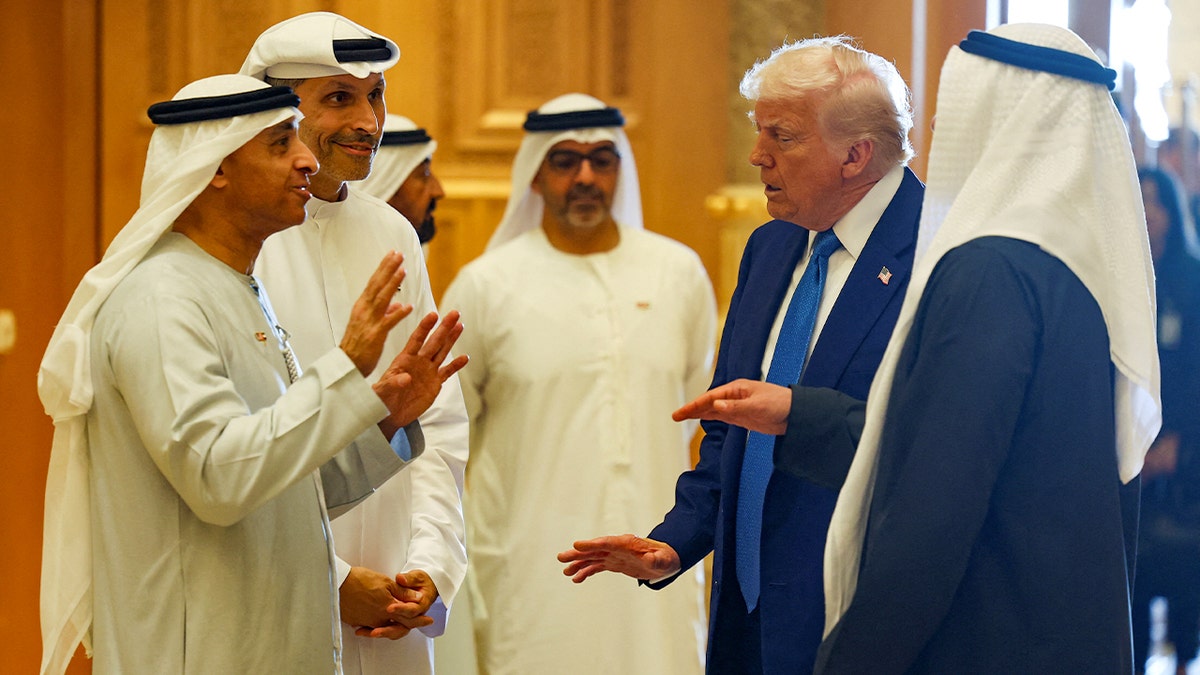
U.S. President Donald Trump attends a business forum at Qasr Al Watan during the final stop of his Gulf visit, in Abu Dhabi, United Arab Emirates, May 16, 2025. (REUTERS/Amr Alfiky)
TRUMP WRAPS MOMENTOUS MIDDLE EAST TRIP WITH ECONOMIC DEALS, SYRIA SANCTIONS RELIEF AND WARNING TO IRAN
By the end of Trump’s trip, the House Select Committee on the Chinese Communist Party had introduced new legislation «to stop advanced U.S. AI chips from falling into the hands of adversaries like the Chinese Communist Party (CCP).»
«The ambition is understandable – drawing the Gulf states deeper into the U.S. tech ecosystem is a logical way to counterbalance China’s growing influence,» Craig Singleton, China Program Senior Director and Senior Fellow with the Foundation for Defense of Democracies told Fox News Digital. «But the devil is in the details.
«Without rigorous safeguards and clear conditions on technology transfer, there’s a real risk of leakage — whether it’s advanced chips, know-how, or access to AI platforms,» he warned. «If these deals lack meaningful restrictions, they could end up strengthening the very actors they’re meant to contain.»
The Commerce Department did not immediately respond to Fox News Digital’s questions on AI security.
While questions remain about the future of AI security, some reports suggested that the expanded U.S. agreements could help cement the U.S. as the global leader in the emerging technology and help shape its landscape.
But China has interests outside of AI in the region that pertain to security, economic and energy sectors – all of which the U.S. has a vested interest in deterring.
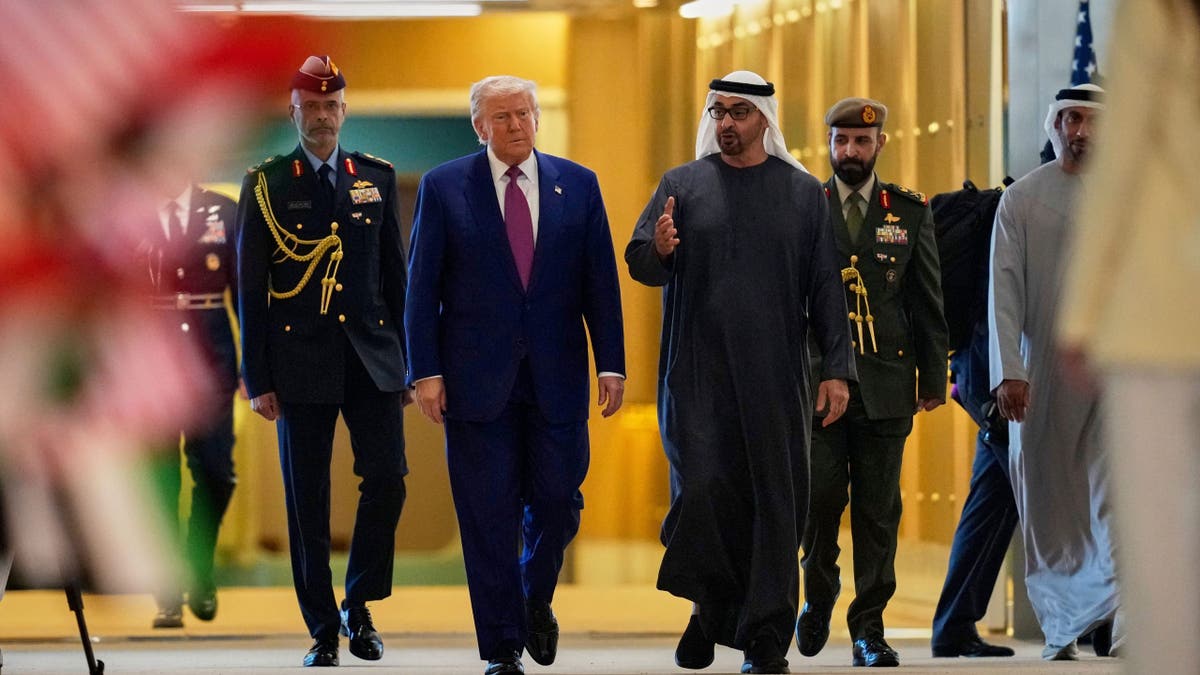
United Arab Emirates President Sheikh Mohammed bin Zayed Al Nahyan greets President Donald Trump at Abu Dhabi International Airport on Thursday, May 15, 2025. (AP Photo/Altaf Qadri)
Trump was the first president in nearly 20 years to visit the UAE, which security experts have told Fox News Digital will go a long way to further not only geopolitical goodwill amid major unrest stemming from the wars in Gaza and Ukraine, but it could even further bolster economic and security opportunities between Washington and Abu Dahbi.
«Trump showing up and re-committing American military and economic power to support the UAE’s stability, security, and success in a dangerous neighborhood can pay real dividends going forward,» John Hannah, former national security advisor to Dick Cheney and current Randi & Charles Wax senior fellow at the Jewish Institute for National Security of America (JINSA), told Fox News Digital.
«Since at least the time of President Obama’s nuclear deal with Iran, there’s been a slow, but noticeable drift in UAE strategy away from its deep reliance on the United States toward more of a hedging policy of playing all sides of the global great game, including an increasingly close relationship with China,» he added.
CLICK HERE TO GET THE FOX NEWS APP
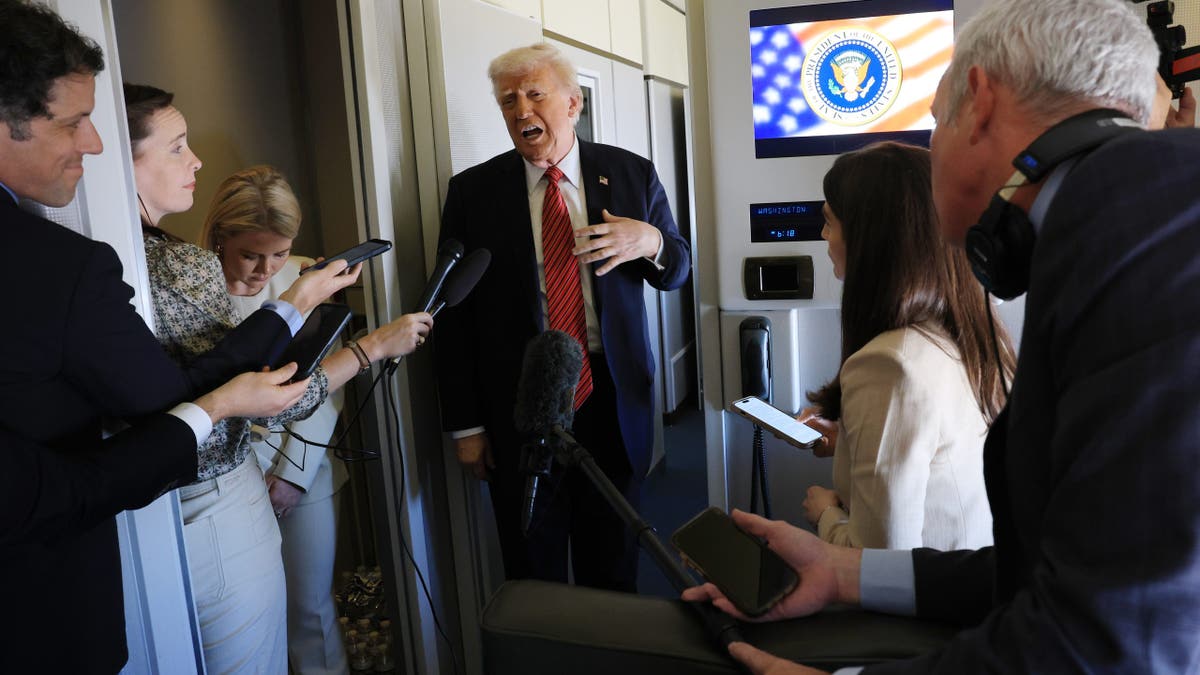
IN FLIGHT – MAY 14: U.S. President Donald J. Trump speaks to travelling media aboard Air Force One on a range of issues, including Syria, as he flies to Doha, Qatar on May 14, 2025. Trump is on the second day of a multi-nation tour of the Gulf region focused on expanding economic ties and reinforcing security cooperation with key U.S. allies. (Photo by Win McNamee/Getty Images)
Hannah explained that a period of American weariness of the Middle East enabled China to effectively expand its geopolitical interests in the vital region.
The expert pointed out that not only does the UAE host U.S. troops on its soil, but its trade value with the U.S. – even prior to the $1.4 trillion deal it reached earlier this year – was worth some $35 billion annually.
«With a country as influential and resource-rich as the UAE, correcting that unhelpful perception and putting the strategic relationship back on a much more positive dynamic is an important goal,» Hannah said.
Fox News Digital could not immediately reach the UAE foreign ministry for comment.
INTERNACIONAL
El aeropuerto de Múnich suspendió sus operaciones tras el sobrevuelo de drones no autorizados: 3.000 pasajeros afectados

El aeropuerto de Múnich, uno de los principales centros de conexiones aéreas de Alemania, suspendió sus operaciones la noche de este jueves tras una serie de avistamientos de drones en las inmediaciones, causando la cancelación de 17 vuelos y el desvío de otros 15 a distintas ciudades alemanas y a la vecina Austria ante la imposibilidad de garantizar la seguridad de las operaciones.
Según precisó la propia terminal aérea en un comunicado difundido a primera hora de este viernes, cerca de 3.000 pasajeros resultaron afectados por la interrupción.
Las rutas afectadas trasladaron su destino a los aeropuertos de Stuttgart, Nuremberg, Frankfurt y Viena mientras la terminal principal de Baviera, considerada uno de los mayores centros de tránsito aéreo de Alemania, permanecía sin operar. La medida generó amplias consultas y demoras para los pasajeros, aunque personal del aeropuerto indicó que “todo está bajo control y el aeropuerto reabrirá a las cinco”.
Durante el primer semestre de 2025, el aeropuerto de Múnich gestionó el viaje de casi 20 millones de pasajeros, en parte por su papel como base de la aerolínea nacional Lufthansa y su relevancia para el sur del país. El incidente reciente tuvo un impacto inmediato en la conectividad internacional y el tráfico nacional de Alemania, justo cuando otros países europeos están en alerta ante situaciones similares.

En días previos, terminales aéreas en Dinamarca y Noruega interrumpieron actividades tras recibir reportes sobre drones no autorizados en zonas seguras, complicando la agenda de miles de usuarios. Ante estos hechos, el gobierno danés resolvió prohibir temporalmente cualquier vuelo civil de drones por sobre su espacio aéreo e incrementar la vigilancia.
Las autoridades europeas han expresado preocupación por la reiteración de estos casos. Recientemente, altos mandos y gobiernos han detectado incursiones de drones rusos en los cielos de Polonia y Rumania, así como episodios de violaciones aéreas sobre Estonia por parte de aviones de combate. Esta serie de incidentes se produce en el contexto de la guerra en Ucrania y el refuerzo de controles en la frontera europea.
La primera ministra de Dinamarca, Mette Frederiksen, indicó en días recientes que no se podía confirmar el origen de los drones, aunque advirtió que “principalmente hay un país que supone una amenaza para la seguridad europea y ese país es Rusia”. En respuesta a los reclamos internacionales, el gobierno ruso negó su implicación en estos hechos y rechazó cualquier relación con las supuestas operaciones en espacio aéreo de otros Estados.
El caso de Múnich se suma a las precauciones extremas derivadas de una oleada de incidentes recientes en la ciudad. A inicios de semana, el reconocido festival Oktoberfest fue clausurado durante varias horas debido a una amenaza de bomba, mientras que la policía local investigó el hallazgo de explosivos en una zona residencial al norte de la capital bávara.
Estos acontecimientos intensificaron el despliegue de patrullas y de protocolos de monitoreo aéreo en el aeropuerto y otros puntos sensibles de la región. Las autoridades alemanas supervisan la evolución de la situación en coordinación con instancias de la Unión Europea, que días atrás aprobó nuevas estrategias comunes de defensa para enfrentar la amenaza de drones en aeropuertos y fronteras continentales.
Se espera que la terminal aérea de Múnich reabra al público a las 5:00, hora local, aunque las autoridades mantendrán las restricciones de seguridad.
Pidieron a los pasajeros informar en todo momento a las autoridades sobre cualquier actividad sospechosa. Delegados aeroportuarios reiteraron en la reapertura: “Algunos vuelos están esperando autorización, otros han sido cancelados; todo está bajo control”.
(Con información de Reuters)
Europe
INTERNACIONAL
ICE director says Portland facility faces violence with ‘little help from local police’
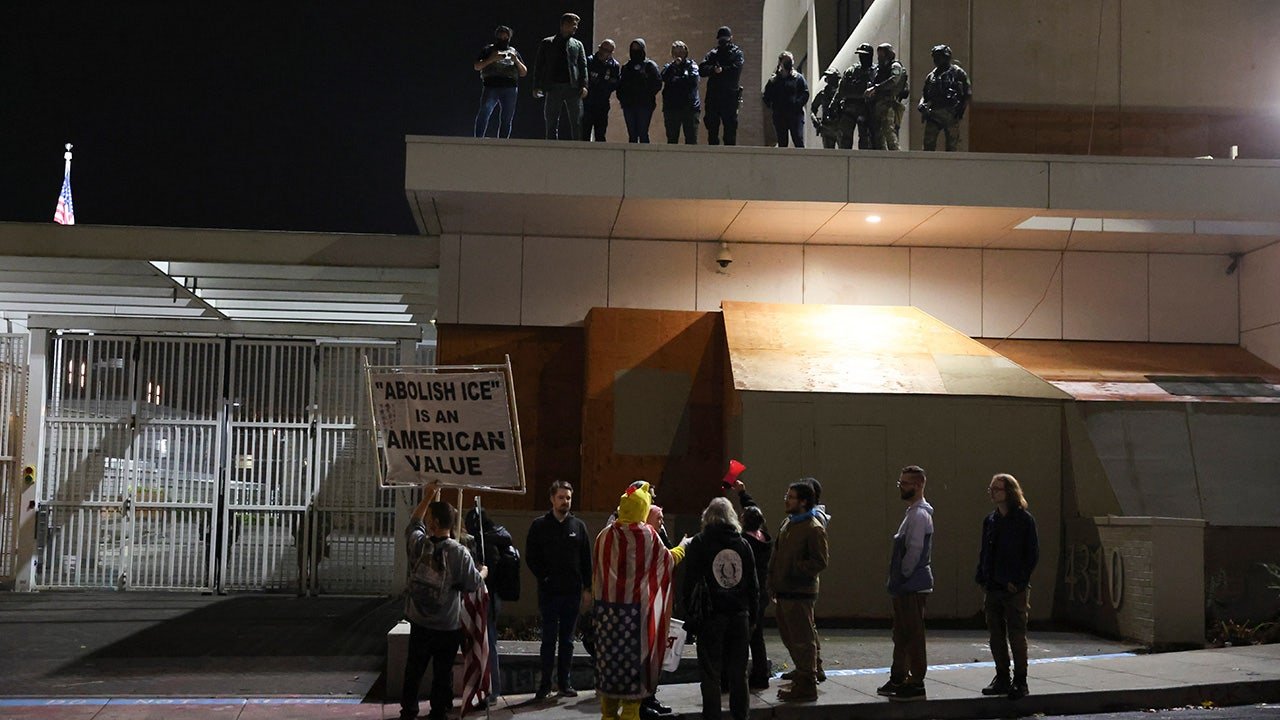
NEWYou can now listen to Fox News articles!
Federal immigration officials say their Portland, Oregon, facility has come under nightly attack, with little help from local police because of political directives from city leaders.
In an exclusive interview with Fox News’ Bill Melugin, Cammila Wamsley, director of Portland’s ICE office, said the facility has faced violence for more than 100 consecutive nights, with Portland police largely absent under guidance from the mayor and city council.
«I just, I can’t figure out what’s happening at the FDA. I’m totally baffled by it,» Wamsley said, describing her frustration at seeing federal staff attacked outside the building while officers inside lack jurisdiction to intervene. «It’s frustrating for us to watch people be attacked on the street and know that we don’t have the authority to be able to really step in unless there’s some nexus to federal law.»
She said nightly protests have escalated beyond chants and signs, with bottle rockets striking the ICE building, rocks shattering windows, lasers targeting officers’ eyes and barricades blocking vehicles.
ANTI-ICE PORTLAND RIOTERS WITH GUILLOTINE CLASH WITH POLICE IN WAR-LIKE SCENES
People protest outside a U.S. Immigration and Customs Enforcement facility as federal agents watch from the rooftop in Portland, Ore., Wednesday. (AP Photo/Amanda Loman)
Wamsley said protesters have followed ICE staff members home and doxxed at least six employees.
«Later, towards the evening and around dark, there are a lot of folks that come up dressed in all black,» she explained. «They are here to wreak havoc. They’ll block our cars, throw paint, damage property and even try to follow our folks home.»
She warned that when crowds swell quickly, the violence becomes more dangerous.
ICE DIRECTOR REVEALS DANGEROUS NIGHTLY ANTIFA ‘BATTLE’ AS TRUMP PREPARES FEDERAL DEPLOYMENT TO PORTLAND
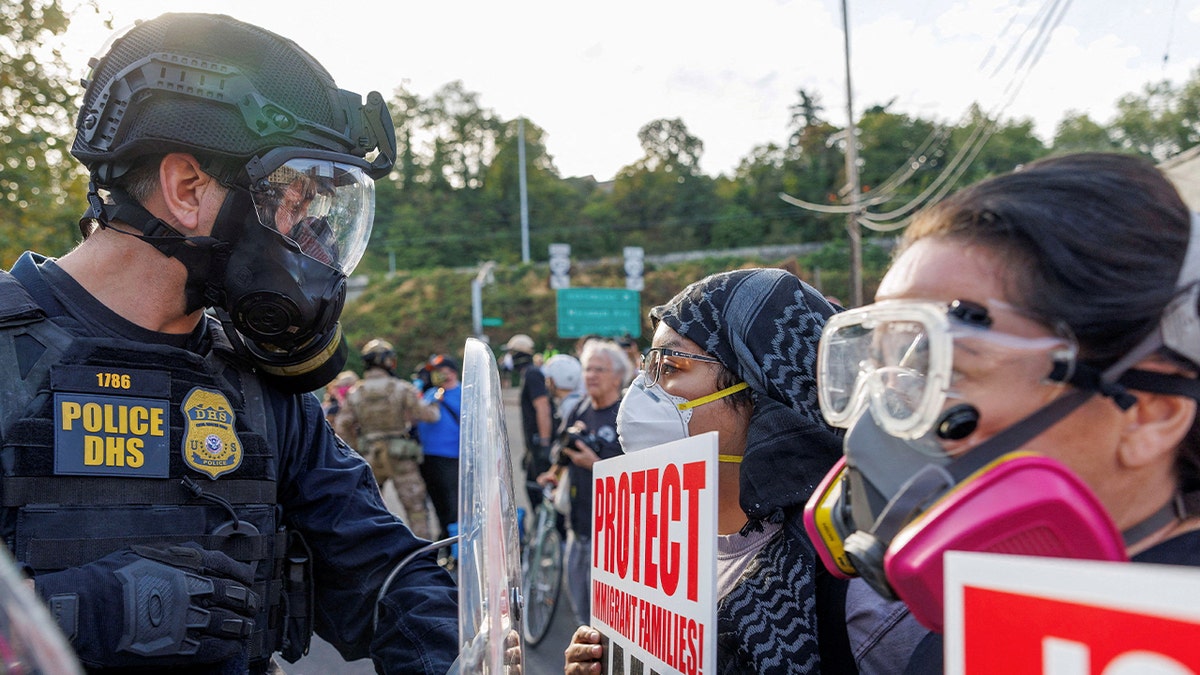
A Federal Protective Service officer stands guard in front of demonstrators as protests against Immigration and Customs Enforcementdraw hundreds to the ICE headquarters in south Portland, Ore., Sunday. (John Rudoff/Reuters)
«We’ve seen it before. The folks here can go from a crowd of 50 to a crowd of 1,000 in 30 minutes,» she explained. «Sometimes we only have 20 officers here. We would not be able to defend the building with that show of force.»
Wamsley said the Portland Police Department has been slow to respond — and sometimes doesn’t respond at all — because of city policy. She explained that assaults have occurred outside and across the street from the building, but police have either taken too long to arrive or not shown up at all.
«That is not the stance they would take six blocks from here, but it is the stance they take with us because of guidance from the mayor and city council,» Wamsley said.
PORTLAND MAYOR DOUBLES DOWN ON SANCTUARY STATUS AFTER VIOLENT ANTI-ICE RIOT
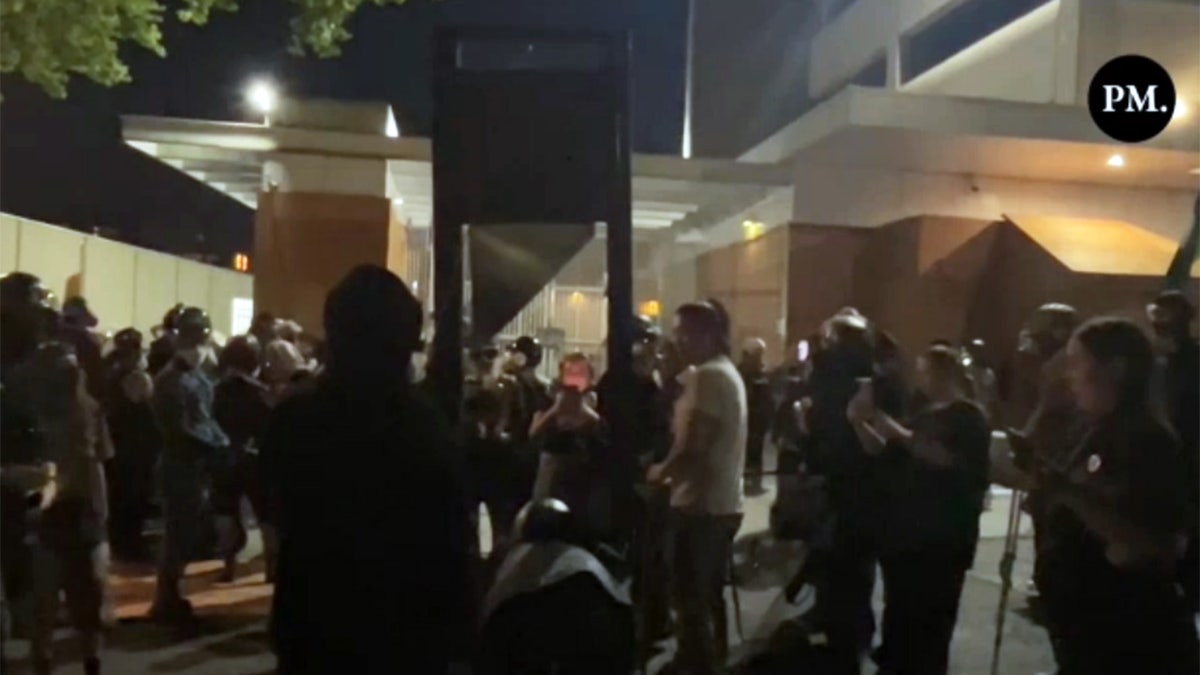
Anti-ICE protesters roll out a guillotine in front of the ICE field office in Portland, Ore. (X/@KatieDaviscourt)
Fox News Digital has reached out to the Portland mayor’s office and police department for comment.
Still, Wamsley said ICE staff remain committed to their mission despite the unrest.
«The people that work here are here to serve the American public,» she said. «They are here to enforce the same immigration laws we’ve had in place since the 1950s. Nothing has changed in that regard. We come to work every day. We do our job the way we have been doing it, and we’ll continue to do that.»
PORTLAND RAMPS UP PRESSURE ON ICE BUILDING WITH LAND USE VIOLATION NOTICE
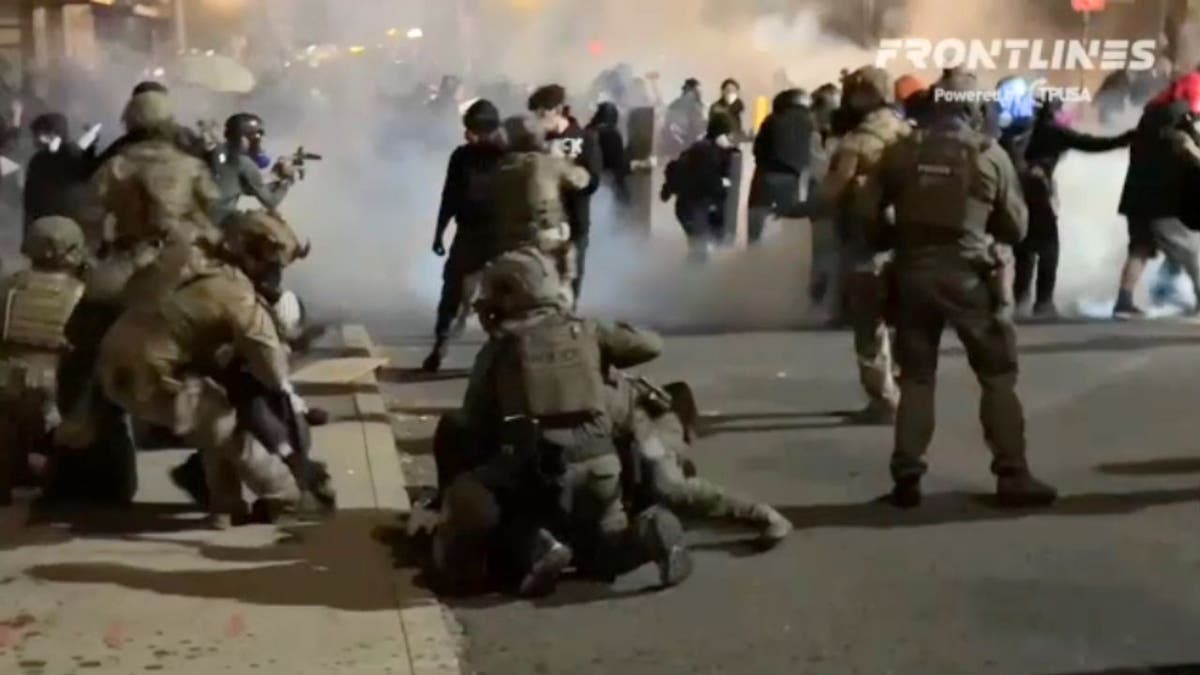
Federal agents arrest a person outside an Immigration and Customs Enforcement facility in Portland, Ore., in June. (X/@choeshow/@frontlinesTPUSA)
Todd Rignel, assistant special agent for Homeland Security Investigations (HSI) in Oregon, said federal agencies are targeting Antifa-linked groups they blame for organizing much of the unrest.
«They’re not just facing HSI. They’re facing the FBI, ATF, DEA, IRS — all of these agencies,» he said. «That’s a force to be reckoned with.»
Portland remains a flashpoint for unrest with the ICE facility at the center of nightly confrontations.
President Donald Trump announced plans to send 200 National Guard troops to Portland to support immigration authorities. Officials said the troops would be stationed near protest areas.
CLICK HERE TO DOWNLOAD THE FOX NEWS APP
The warnings follow an attack on an ICE facility in Dallas Sept. 24. Authorities said two detainees were killed and another was hospitalized after a gunman opened fire before dying of a self-inflicted gunshot.
Investigators said shell casings recovered bore an «ANTI-ICE» message.
Fox News Digital’s Madison Colombo contributed to this report.
oregon,homeland security,immigration,antifa,vandalism
INTERNACIONAL
Recordando a Jane Goodall, la gigante defensora de los animales, en imágenes

Jane Goodall, en imágenes

 POLITICA1 día ago
POLITICA1 día agoCristina Kirchner chicaneó a Javier Milei: “La Recesión Avanza y los dólares se te siguen yendo”

 CHIMENTOS3 días ago
CHIMENTOS3 días agoMario Massaccesi casó a Manu Jove y su colega de TN: los desconocidos detalles de la boda

 POLITICA19 horas ago
POLITICA19 horas agoAxel Kicillof pide deuda por US$1045 millones y pone a prueba la cohesión del PJ en la Legislatura



























